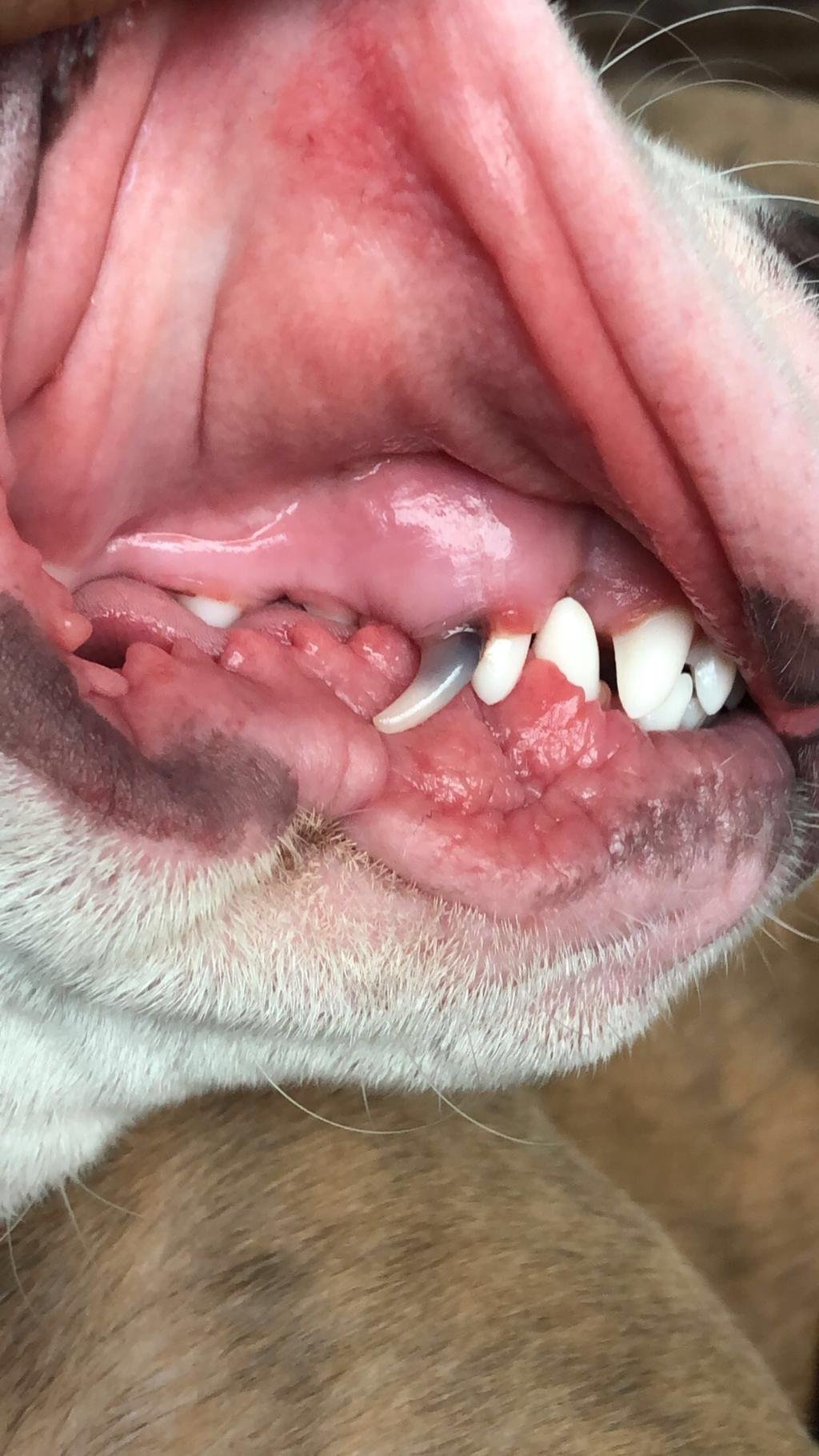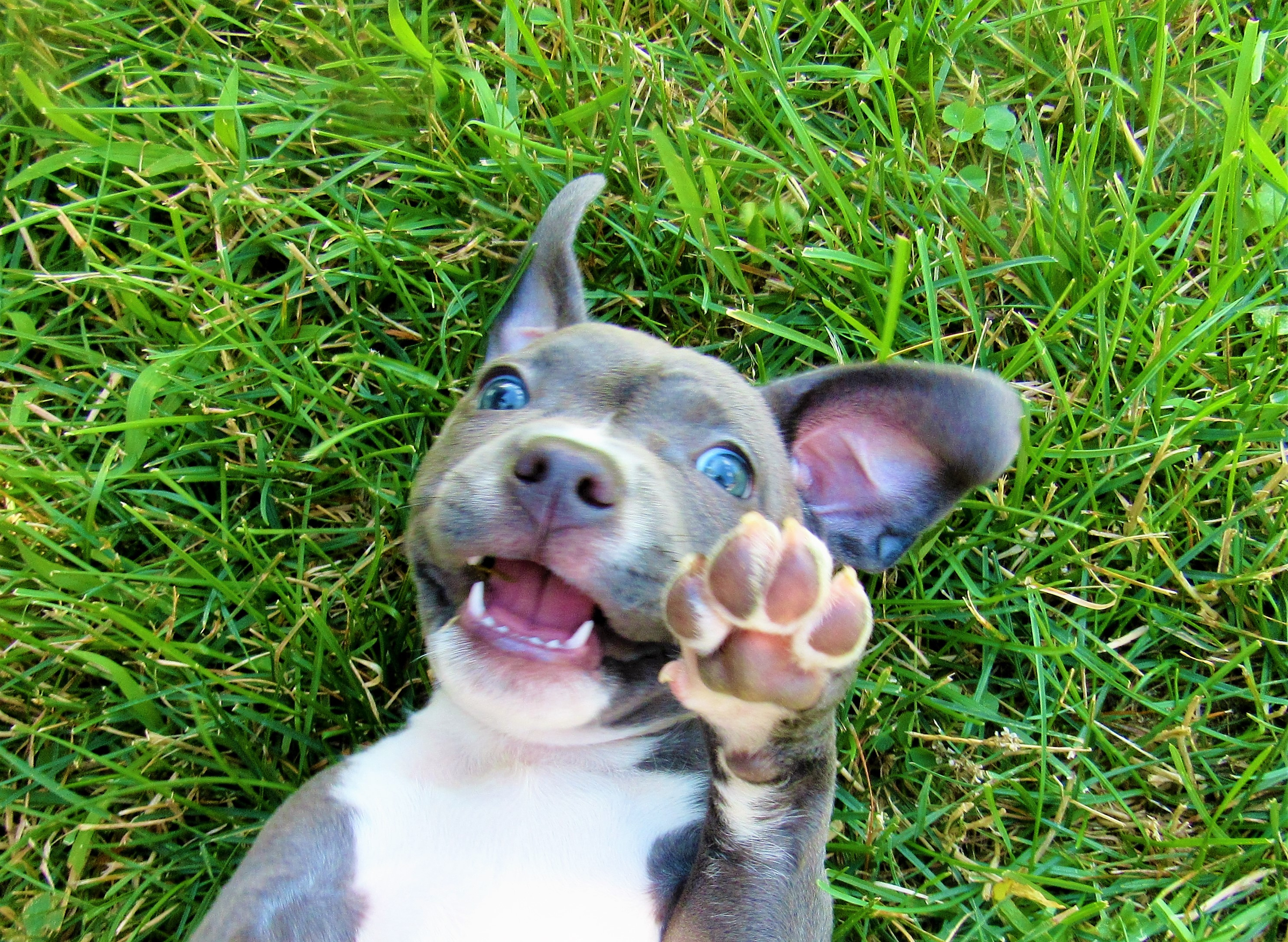Did you know that just like human babies, pitbull puppies also go through a teething phase? During this time, their little teeth may start to fall out, leaving some owners worried. But fear not, as this is a natural and normal process that happens to all puppies, including pitbulls!
When it comes to pitbull puppies and their teeth, it’s important to understand that they, like all dogs, have two sets of teeth. The first set, known as deciduous or baby teeth, start to appear around 3-4 weeks of age. These temporary teeth help puppies learn how to eat and explore their environment. However, around the age of 3-6 months, these baby teeth start to fall out, making way for the permanent adult teeth to grow in. This process can be accompanied by some discomfort for the puppy, but it is essential for their dental development.
While it’s completely normal for pitbull puppies’ teeth to fall out, it’s crucial to provide them with appropriate chew toys and dental care to ensure healthy teeth and gums. Regularly brushing their teeth and providing them with safe dental chews can help prevent dental issues down the line. Additionally, scheduling regular check-ups with a veterinarian will help monitor their dental health and address any concerns that may arise during this teething phase. So, while seeing teeth on the floor can be alarming, it’s all part of the natural development of a pitbull puppy’s dental health.

Do Pitbull Puppies’ Teeth Fall Out? Exploring the Teething Process in Pitbull Puppies
Pitbull puppies are adorable and full of energy. As a new owner, it’s important to understand the development stages they go through, including teething. Many owners wonder, “Do pitbull puppies’ teeth fall out?” In this article, we will delve into the teething process of pitbull puppies, addressing common concerns and providing valuable information to help you navigate this stage with ease.
Understanding the Teething Process
Teething is a natural and necessary process that all puppies go through. It typically begins when a puppy is around three to four weeks old and lasts until they are six to eight months old. During this time, your pitbull puppy’s baby teeth will start to fall out, making way for their permanent teeth.
The teething process can be uncomfortable for puppies, leading to increased chewing and biting behaviors. This is because chewing helps soothe their gums and relieve the discomfort. As a responsible owner, it’s essential to provide appropriate chew toys and supervise their chewing activities to prevent them from damaging furniture or household items.
The timeline for teething in pitbull puppies is not set in stone, as each puppy’s development may vary. However, the general pattern is as follows:
- Week 3-4: The puppy’s baby teeth will start to emerge, and they will begin to explore objects by mouthing and chewing.
- Week 12-16: The puppy’s baby teeth will start to fall out, and their adult teeth will begin to come in. This may cause mild discomfort and increased chewing activity.
- Week 24-28: The puppy should have most of their adult teeth, and the teething process will gradually come to an end.
Caring for Your Pitbull Puppy’s Teeth
During the teething process, it is crucial to take extra care of your pitbull puppy’s oral health. Here are some tips to ensure their teeth and gums remain healthy:
- Provide appropriate chew toys: Invest in quality chew toys specifically designed for teething puppies. This will help satisfy their natural chewing instinct and provide relief to their sore gums.
- Regular brushing: Start a regular brushing routine using a dog-friendly toothbrush and toothpaste. Brushing your puppy’s teeth from a young age will help establish good dental hygiene habits and prevent future dental issues.
- Healthy diet: Feed your pitbull puppy a balanced diet that promotes good oral health. Consult with your veterinarian to ensure you are providing the right nutrition for your puppy’s growing needs.
- Regular vet check-ups: Schedule regular check-ups with your vet to monitor your puppy’s dental health and address any concerns or questions you may have.
The Benefits of Proper Dental Care
Proper dental care for your pitbull puppy not only benefits their oral health but also their overall well-being. Neglecting dental care can lead to various problems, including:
- Tooth decay: Infected and decayed teeth can cause pain and discomfort for your puppy.
- Gum disease: Poor dental hygiene can lead to gum disease, which can result in tooth loss, bad breath, and even systemic health issues.
- Misaligned teeth: Ignoring dental care during the teething process can lead to misaligned adult teeth, causing issues with their bite and potential difficulty in chewing food.
By prioritizing your pitbull puppy’s dental care, you can contribute to their long-term health and ensure they have a strong and healthy smile as they grow older.
Pitbull Puppy Teething Tips
The teething process can be challenging for both you and your pitbull puppy. However, with the right knowledge and preparation, you can make this stage more manageable. Here are some additional tips to help you navigate pitbull puppy teething:
1. Patience is key:
Remember that teething is a natural process, and your puppy may exhibit increased chewing and biting behaviors during this time. Stay patient and provide them with appropriate outlets for their chewing needs.
2. Supervise chewing activities:
Keep a close eye on your puppy when they are chewing to ensure they are not damaging their toys or getting into potentially harmful situations. This will help prevent accidents and keep them safe.
3. Chill toys in the fridge:
If your puppy’s gums are particularly sore, try chilling their chew toys in the fridge before giving them to your puppy. The coldness can help numb their gums and provide soothing relief.
4. Redirect biting behavior:
If your puppy starts nipping or biting during playtime, redirect their attention to an appropriate toy or provide a gentle correction. Consistency is key to teaching them what is acceptable behavior.
5. Stay consistent with training:
Continuing with obedience training during the teething process will not just benefit their behavior but also redirect their energy and focus. Training sessions provide mental stimulation and help tire them out.
Conclusion
The teething process in pitbull puppies is a natural part of their development. While it may present some challenges, with proper care and attention, you can ensure that your pitbull puppy’s teeth grow in strong and healthy. Remember to provide appropriate chew toys, establish a regular brushing routine, and prioritize their dental health with the help of regular vet check-ups. By taking these steps, you can navigate this stage with confidence and set your pitbull puppy up for a lifetime of excellent oral health.
Do Pitbull Puppies Teeth Fall Out?
Pitbull puppies experience teething, just like human babies.
- Teething usually begins around 3 to 4 months of age.
- During this time, their baby teeth start to fall out.
- New adult teeth gradually replace the baby teeth.
- This process can cause discomfort and chewing behavior.
- It is important to provide appropriate chew toys for relief.
Frequently Asked Questions
Pitbull puppies are adorable and curious creatures. Like all puppies, they go through various stages of development. One common question that comes up is related to their teeth and whether they fall out. Here are some answers to frequently asked questions about pitbull puppies’ teeth.
1. When do pitbull puppies start losing their baby teeth?
Just like humans, pitbull puppies have baby teeth, also known as deciduous teeth. They start getting their baby teeth at around three to four weeks old. From four to six months, they go through a teething process where the baby teeth gradually fall out and are replaced by adult teeth. During this period, puppies may experience discomfort and may chew on objects to alleviate it. Providing appropriate chew toys can help them through this stage.
By the age of six months, most pitbull puppies will have their full set of adult teeth. It’s important to note that the timing can vary among individual puppies, and some may lose their baby teeth a bit earlier or later than others.
2. Can I help my pitbull puppy when they’re teething?
Yes, you can help your pitbull puppy when they’re teething. Just like human babies, teething puppies may experience discomfort. Providing appropriate chew toys, such as rubber or nylon toys designed for teething, can help soothe their gums and provide relief. Avoid giving them toys that are too hard or small, as they can cause dental issues or become a choking hazard.
It’s also important to maintain good oral hygiene during this time. Gently brushing their teeth with a dog-specific toothbrush and toothpaste can help prevent plaque buildup and keep their gums healthy. Additionally, scheduling regular check-ups with a veterinarian can ensure any dental issues are addressed promptly.
3. Is it normal for pitbull puppies to lose a tooth while playing?
It is not uncommon for a pitbull puppy to lose a tooth while playing. Puppies explore the world through their mouths, and vigorous play can sometimes result in a tooth getting knocked out. This is usually not a cause for concern, as long as it is a baby tooth and an adult tooth is ready to take its place.
However, if an adult tooth is knocked out, it is important to consult with a veterinarian as soon as possible. Losing an adult tooth may require treatment or intervention to prevent further complications. It’s always best to err on the side of caution and seek professional advice in such situations.
4. How should I care for my pitbull puppy’s teeth?
Caring for your pitbull puppy’s teeth involves a combination of regular dental care at home and professional veterinary dental exams. Start by getting your puppy used to having their teeth brushed from a young age. Use a dog-specific toothbrush and toothpaste to clean their teeth gently.
It is also important to provide chew toys and dental treats that can help keep their teeth clean and healthy. Regular veterinary dental check-ups, starting from puppyhood, can help identify any dental issues early and address them promptly. Your veterinarian can provide specific recommendations for your pitbull puppy’s dental care needs.
5. Are there any dental issues specific to pitbull puppies?
Pitbull puppies are generally prone to similar dental issues as other dog breeds. These can include periodontal disease, tooth decay, and malocclusion (misalignment of teeth). Proper dental care, including regular brushing, providing appropriate chew toys, and scheduling veterinary dental check-ups, can help prevent and address these issues.
It’s important to note that every dog is unique, so the dental care needs of pitbull puppies can vary. Regular monitoring of your puppy’s mouth, addressing any signs of discomfort, and seeking professional guidance from a veterinarian is key to maintaining their dental health.
Summary
Hey there! So, let’s wrap things up about pitbull puppy teeth. Do their teeth fall out? Well, just like human babies, when pitbull puppies are around 3-6 months old, their baby teeth start to fall out to make way for their adult teeth. It’s totally normal!
But don’t worry, these little puppers don’t have a tough time with it. Usually, you won’t even find their baby teeth lying around because they typically swallow them while eating. So, no need to panic if you can’t find any tiny teeth on the floor!
Remember, if you have any concerns about your pitbull puppy’s teeth, it’s always best to check with your vet. They are the experts who can give you the right advice and ensure your furry friend’s dental health. Take care of those puppy teeth, and keep smiling!

